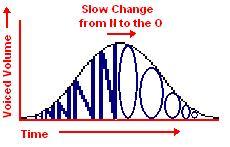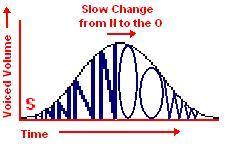PFSP-Day 5-Slow Change and Reduced Air Pressure
Thursdays practice with Gentle Onset was only with vowels. But what happens when the first stretchable sound is not a vowel? What happens with constricted sounds? And Fricative or Popping sounds? Well they can be a little different.
For this we learnt 2 new targets; Slow Change and Reduced Air Pressure.
Slow Change is the slow, controlled, articulatory change from one stretchable sound to another stretchable sound. For example; the word ‘NO’ has 2 stretchable sounds, you will use a gentle onset for the ‘N’ sound, slowly increase the volume to full, then slowly change your vocal folds and vocal tract constrictions into the ‘O’ sound positions. Vocal tract constrictions changes would include lowering your tongue from the back of your teeth, slightly increase the parting of your teeth, and forming a circle with your lips.

Notice words ‘stretchable’ in that last paragraph? They’re there for a reason; you can’t do a slow change from a Fricative, because you will lose all of your air before getting to the next letter.
Reduced Air Pressure is for the Fricatives. By reducing air pressure on these sounds, you have air to perform the Gentle Onset with the first stretchable sound.
So, if you have a word like ‘SNOW’, the first sound is a Fricative and should be approached with minimal air pressure as to keep the sound audible.

Hear it
Two things I’ve learned by stretching my voice for the past few days is; a) my voice jumps wildly in pitch and volume, and b) I can’t seem to differentiate between raising my pitch and volume.
Lori, my therapist, often walks into the clinic test room when my gentle onset test box doesn’t appear to be working correctly. She knows immediately what my problem is and always says the same things; “You’re raising your pitch, not your volume”, and “Talk like a robot”. I do it, and sure enough it works.
She has also pointed out that I keep trying to rush through the tests and as soon as I do that, I lose my ability to perform the targets correctly. My god, is she a mind reader? How does she know this? ;-)
Lori also pointed out a major thing on Friday; I don’t speak until my natural exhale has completed, and I am getting all of my air from forcing left out the remaining air. Now, I’ve noticed that I will speak long past the point where common sense tells me to breath in. This is not uncommon for stutterers who block. The rational goes something like “I only block when starting, so if I can get it all out now, I won’t have to restart, and I won’t block”. But I had no idea this was my standard speaking protocol. So basically, even when I’m spontaneously fluent, as I’ve been this week, my speaking method is defective!
This is a major point of information … it’s a freak’n epiphany!
Lori is very observant.
Not meant as advice, please find a qualified therapist if you are interested in similar therapy.


0 Comments:
Post a Comment
<< Home